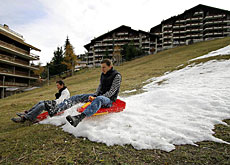Sunshine replaces snow in Alps

A high-pressure zone over much of Europe has led to unseasonably warm weather in the mountains and a lack of snow for the all-important Christmas ski period.
However, most hotels and apartments in Swiss ski resorts are fully booked, and the tourist industry has reported few if any cancellations.
The high-pressure zone has affected much of western Europe’s weather since December 19. It has led to a thick layer of fog settling over Switzerland’s valleys and plains, and clear blue skies – and higher temperatures – above 1,000m.
This temperature inversion has meant freezing temperatures in the lowlands and up to eight degrees Celsius in some mountain resorts over Christmas and Boxing Day.
Most resorts have only a thin layer of snow on their slopes, and in many places less than the 30cm minimum judged necessary for satisfactory ski conditions.
Andermatt in the normally snow-rich central Swiss Alps, reported only 35cm, and Gstaad in the Bernese Alps had 10cm while the southeastern mountain village of Arosa is making do with a mere 20cm, and 40cm on its upper runs.
Zermatt is faring better with a snow depth between 34cm and 163cm.
The national tourist office, Switzerland Tourism, said despite the limited skiing opportunities luxury hotels and holiday apartments and chalets were still booked up during what is normally the busiest two weeks of the year.
Loyal guests
A tourist office spokeswoman, Edith Zweifel, said many visitors who spend their Christmas holidays in the Swiss Alps are repeat customers, who remain loyal even when there is little snow.
She also said the number of non-skiing tourists was on the rise. A survey done in the western Villars-Gryon ski area between 2004 and 2006 found that every fourth tourist had not come to ski, but to relax in a spa or enjoy walks in the snow.
The national weather service, MeteoSwiss, is not forecasting any change in the situation before Sunday.
The unusually warm and dry start to the winter in the Alps comes after the mildest autumn on record, with temperatures up to four degrees higher than in previous years and a degree higher than the earlier record in 1987.
MeteoSwiss said it was due to a constant influx of high pressure linked to subtropical conditions.
swissinfo with agencies
2006 was the fifth warmest year since temperatures began being recorded in 1861.
Global warming has led to the retreat of the Alps’ glaciers, and a rise in temperatures also increases the risk of landslides as permafrost thaws.
According to a recent study by the OECD, global warming could put all alpine ski resorts located at an altitude lower than 1,500m out of business.

In compliance with the JTI standards
More: SWI swissinfo.ch certified by the Journalism Trust Initiative










You can find an overview of ongoing debates with our journalists here . Please join us!
If you want to start a conversation about a topic raised in this article or want to report factual errors, email us at english@swissinfo.ch.